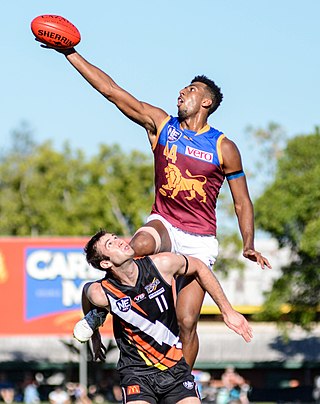
Australian rules football, also called Australian football or Aussie rules, or more simply football or footy, is a contact sport played between two teams of 18 players on an oval field, often a modified cricket ground. Points are scored by kicking the oval ball between the central goal posts, or between a central and outer post.
Exhibition matches in Australian rules football have been used to promote the game as a demonstration sport outside of its heartlands in Australia.

Recreational Football was a non-contact version of the Australian rules football game first played in 2003 and later sanctioned by the Australian Football League's game development arm, it was inspired heavily by the growing popularity of tag rugby. It was a more accessible version of Australian rules football that people could pick up and play. It was a mixed competition, with eight players on each team, accessible to players of both sexes, all shapes and sizes and requires minimal equipment to play. Rec Footy was criticised mainly by Australian rules players for appearing similar to netball and being too restrictive, lacking of ability for skilled footballers to run kick and play naturally whilst also penalising newer unskilled players with frequent turnovers.
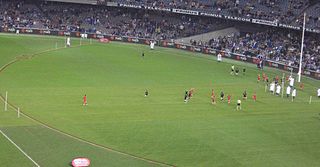
Auskick is a program designed to teach the basic skills of Australian football to children aged between 5 and 12. Auskick is a non-contact variant of the sport. It began in Australia and is now a nationwide non-selective program. It has increased participation and diversity in the sport amongst children, and is now being run in many countries across the world.
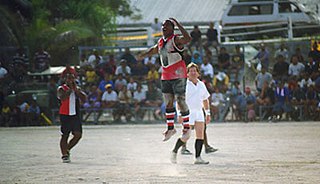
The Geography of Australian rules football describes the sport of Australian rules football played in more than 60 countries around the world. By 2017 more than 26 nations had contested the Australian Football International Cup, the highest level of worldwide competition.

Women's Australian rules football, is the female-only form of Australian rules football, generally with some modification to the laws of the game.
Nine-a-side football is a sport based on Australian rules football played informally by Aussie rules clubs but not yet an official sport in its own right.
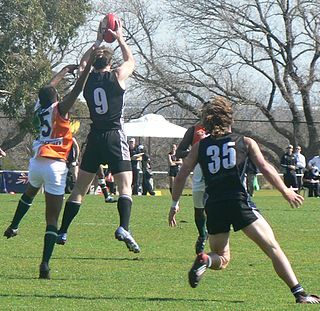
Australian rules football in New Zealand is notable as the first colony outside of Australia to take up the sport as early as the 1860s and was home to the first club formed outside Australia in 1876. The sport's official name was changed in 1890 to Australasian Football acknowledge New Zealand's participation and remained for some time even after the country was expelled from the Australasian Football Council. After a half century hiatus of organised competition, it has grown rapidly as an amateur sport. Today five of New Zealand's sixteen regions have organised competitions: Auckland ; Canterbury ; Wellington ; Waikato and Otago. A four-team national competition with a national draft has been contested at the North Harbour Stadium in Auckland since 2016 for men and 2019 for women. The national team were crowned International champions at the 2005 Australian Football International Cup and competed annually against the AFL Academy between 2012 and 2019. Since the 2010s the game has also grown at junior level among New Zealand schools as the "Hawks Cup".

Australian rules football in England is a team sport and spectator sport with a long history. It is home to the longest running Australian rules fixture outside Australia, the match between Oxford and Cambridge Universities which has been contested annually since 1923. The current competitions originated in 1989 and have grown to a number of local and regional leagues coordinated by AFL England. In 2018, these regional divisions were the AFL London, AFL Central & Northern England and Southern England AFL.

Australian rules football in Papua New Guinea (PNG) is a developing team sport which was initially introduced by Australian servicemen during World War II. The governing body for the sport is the PNG Rules Football Council, with the development body being AFL PNG. The junior development version is known locally as Niukick. Regionally, AFL PNG is affiliated with AFL Oceania.
Australian rules football in South Africa is a team sport played at amateur level in the country with a small audience. The governing body is AFL South Africa.

The Australian Football League (AFL) is the pre-eminent and only fully professional competition of Australian rules football. It was originally named the Victorian Football League (VFL) and was founded in 1896 as a breakaway competition from the Victorian Football Association (VFA), with its inaugural season in 1897. It changed its name to Australian Football League in 1990 after expanding its competition to other Australian states in the 1980s. The AFL publishes its Laws of Australian football, which are used, with variations, by other Australian football organisations.

Note: In order to be recognised as a true national team and not simply expatriates, the list is subject to International Cup eligibility rules.

Australian rules football in Africa is most organised in South Africa, although there are programs under development in many African nations including Botswana, Egypt, Ghana, Kenya and Zimbabwe and there are plans to introduce the sport into more African countries.
Australian rules football in Asia dates back to 1910 but was only sporadically played until the 1980s after which it has boomed. Clubs have begun in most Asian countries and a governing body for the region, AFL Asia was formed in 2008 to coordinate the Asian Championship and promote its affiliated leagues. AFL Asia estimates that there are now more than 10,000 Australian Football players across the continent.

Australian rules football is played in Europe at an amateur level in a large number of countries. The oldest and largest leagues are those in the United Kingdom, Ireland and Denmark, in each of these nations there are several established clubs, and organised men's, women's and juniors programs. The British AFL has now expanded into Welsh, Scottish and English leagues. The Danish AFL has been responsible for the expansion of Australian Football into Sweden, Finland, Iceland and Norway. The governing body for Australian Football in Europe was founded in Frankfurt in January 2010; the body was initially called the European Australian Football Association, but changed its name to AFL Europe at a general assembly meeting in Milan in October of the same year. It currently has 22 member nations. AFL Europe, with backing of the AFL in Australia has overseen a large improvement in the organisation of Australian football in Europe.
Australian rules football in the Middle East describes the minority sport of Australian rules football as it is watched and played in the Middle East region.
Variations of Australian rules football are games or activities based on or similar to the game of Australian rules football, in which the player uses common Australian rules football skills. They range in player numbers from 2 up to the minimum 38 required for a full Australian rules football.
AFLX is a variation of Australian rules football designed in 2017 to be played on a soccer field. Unlike the full 18-a-side game —AFLX required less players with some modified rules aimed at generating higher scores, including increased scoring points. It is most notable for its use in official Australian Football League (AFL) pre-season competitions in 2018 and 2019. Post COVID-19 Pandemic the AFL merged it with AFL 9s and retained only the X brand, co-branding AFL 9s as Junior X, Youth X and Senior X and aligning it with the more widely established 9-a-side format.
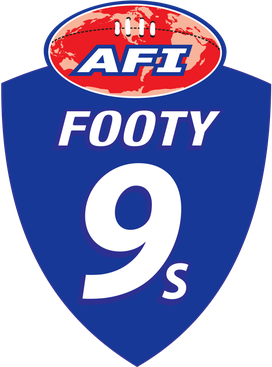
Footy 9s is a version of Australian rules football created by Australian Football International.













